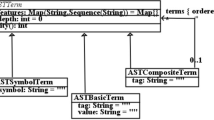Abstract.
In a model-based software systems development formal specifications of the components of the system are developed. Thereby different specifications are used to represent the different aspects or views of the components, possibly following different paradigms. These heterogeneous viewpoint specifications have to be integrated in order to obtain a consistent global specification of the whole system. In this paper transformation systems are introduced as a common semantic domain where specifications written in different languages can be interpreted and formally compared. A transformation system is a transition system where the transitions are labelled by sets of actions and the states are labelled by algebras representing the data states. Development relations and composition operations for transformation systems are investigated, and it is shown that compatible local developments of components induce a global development of their composition. As an application two specifications of the alternating bit protocol are formally compared component-wise, one given in the process calculus CCS, the other one in the parallel programming language UNITY.
Similar content being viewed by others
Author information
Authors and Affiliations
Additional information
Received September 2000 / Accepted in revised form June 2001
Rights and permissions
About this article
Cite this article
Große-Rhode, M. Compositional Comparison of Formal Software Specifications Using Transformation Systems. Form Aspects Comput 13, 161–186 (2002). https://doi.org/10.1007/s001650200005
Issue Date:
DOI: https://doi.org/10.1007/s001650200005




